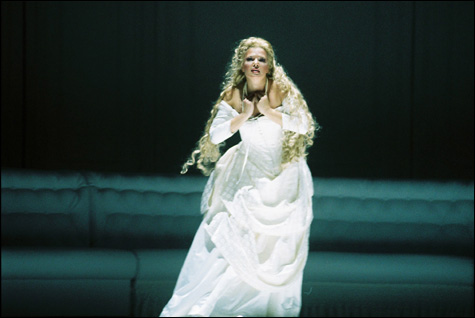Teatro Lirico I at the Majestic Theatre, March 2, 2008
By LLOYD SCHWARTZ | March 4, 2008

LA TRAVIATA: Marina Viskvorkina’s Violetta would satisfy the most demanding audience of any
great opera house. |
Teatro Lirico d’Europa was back for its second weekend this year, and in Verdi’s La traviata, Ukrainian soprano Marina Viskvorkina gave an extraordinary performance as the consumptive courtesan Violetta Valéry. Viskvorkina’s got just about everything: she’s a voluptuous blonde with a big, creamy voice of pinpoint accuracy, and she can act. She began by depicting a very flirtatious Violetta, though her famous first-act coloratura aria, “Sempre libera” (“Always free”), was a little pedestrian. Verdi’s Violetta at first rejects the true love offered by Alfredo Germont, her naive suitor, because she’s terrified of the risks of real feeling. Her “Sempre libera” was about a person who just wants a good time, not about the desperation of someone whose entire way of life is threatened. Her performance became increasingly inward and moving, conveying real dignity as Violetta confronts Alfredo’s father, who wants her to give up his son, and anguish at Alfredo’s public humiliation of her in the party scene. But it was in the last act, with the dying Violetta trying to rally when Alfredo returns, that Viskvorkina ascended to tragic stature. She’s one of the rare Violettas who sings the notes yet still convinces you that she’s physically failing and feverish. And she was heartbreaking. Her performance would satisfy the most demanding audience of any great opera house.As Alfredo, Mexican tenor Gabriel González revealed a likable personality, bare-bones acting skills, and an impressive voice that slid too often off the pitch. Alfredo’s father, Bulgarian baritone Plamen Dimitrov, didn’t have either the vocal heft or the dramatic imagination for this crucial role. He wasn’t embarrassing, but he mainly just stood there. One of my favorite Teatro Lirico singers, mezzo-soprano Viara Zhelezova, as Violetta’s friend Flora, was an object lesson in how to bring a character to life, even if it’s a small role. Character singers Hristo Sarafov and Vladimir Hristov were also exemplary. And an uncredited young male dancer was outstanding in the Gypsy number. The orchestra played better for Krassimir Topolov than it did in January’s Tosca, but he’s hardly anyone’s idea of an inspired conductor.
 Related
Related:
A not-so-merry Widow, Here comes the bride, Fall Classical Preview: The power of music, More 
- A not-so-merry Widow
It’s never a good sign when a company can’t get the name of the work it’s performing right.
- Here comes the bride
It's been a long time since Bostonians had the chance to see the most popular Czech opera, Bedrich Smetana's The Bartered Bride , but Opera Boston followed its electrifying run of Shostakovich's The Nose with this tuneful folk opera and gave it a sweet and very likable production.
- Fall Classical Preview: The power of music
Here’s my Top 10 list, in chronological order, of some of the season’s most appealing and important classical music events: symphonies, chamber music, operas.
- Ring in the new
If 2009 lives up to the grace and power of some of the concerts that began it, we can look forward to a vintage year.
- Obits
The new year brought news of some great losses to the musical world.
- Opera superstar 101
Domingo put his arm around Martínez and whirled her around the stage, asking the audience to sing in their stead.
- Spring break
Spring rules
- Country for old men
A youthful 80-year-old Sir Colin Davis was back in front of the Boston Symphony Orchestra last weekend with one of the pieces he loves most.
- Love and death
“Classic Balanchine” as opposed to . . . “Jazz Balanchine”? “Porno Balanchine”? What was the alternative?
- Opera, opera, opera
Every performance at Santa Fe was packed, and few subscribers left unhappy.
- High Numbers
This article originally appeared in the March 19, 1993 issue of the Boston Phoenix.
- Less

 Topics
Topics:
Live Reviews
, Entertainment, Music, Classical Music, More  , Entertainment, Music, Classical Music, Opera, Giuseppe Verdi, Gabriel Gonzalez, teatro lirico d'europa, teatro lirico d'europa, majestic theatre, Less
, Entertainment, Music, Classical Music, Opera, Giuseppe Verdi, Gabriel Gonzalez, teatro lirico d'europa, teatro lirico d'europa, majestic theatre, Less 